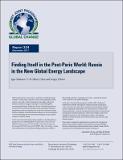| dc.contributor.author | Makarov, Igor | |
| dc.contributor.author | Chen, Y.-H. Henry | |
| dc.contributor.author | Paltsev, Sergey | |
| dc.date.accessioned | 2019-07-01T20:56:30Z | |
| dc.date.available | 2019-07-01T20:56:30Z | |
| dc.date.issued | 2017-12 | |
| dc.identifier.uri | https://hdl.handle.net/1721.1/121471 | |
| dc.description.abstract | The Russian budget relies heavily on exports of fossil fuels, which are the major source of greenhouse gas (GHG) emissions. Climate-related policies that target a reduction in GHG emissions affect substantially the Russian economy. We apply the MIT Economic Projection and Policy Analysis (EPPA) model to assess the impacts of the Paris Agreement on the Russian economy and find that climate-related actions outside of Russia lower Russia’s GDP growth rate by about a half of a percentage point. In addition, Russia faces the risks of market barriers for its exports of energy-intensive goods as well as risks of falling behind in development of new energy technologies that become standard in most of the world. In order to address these risks, the country needs a new comprehensive development strategy taking into account the Post-Paris global energy landscape. We offer suggestions for key elements of such a strategy, including diversification of economy, moving to low-carbon energy, and investing in human capital development. We simulate three simple diversification scenarios showing that redistribution of incomes from energy sector to the development of human capital would help avoid the worst possible outcomes. | en_US |
| dc.description.sponsorship | The authors are thankful for the support provided by the Basic Research Program of the National Research University Higher School of Economics and by the MIT Skoltech Seed Fund Program. Special thanks to John Reilly for his valuable suggestions. The EPPA model used in the study is supported by government, industry, and foundation sponsors of the MIT Joint Program on the Science and Policy of Global Change (https://globalchange.mit.edu/sponsors). | en_US |
| dc.language.iso | en_US | en_US |
| dc.publisher | MIT Joint Program on the Science and Policy of Global Change | en_US |
| dc.relation.ispartofseries | MIT Joint Program Report Series;324 | |
| dc.title | Finding Itself in the Post-Paris World: Russia in the New Global Energy Landscape | en_US |
| dc.type | Working Paper | en_US |
| dc.identifier.citation | Report 324 | en_US |
